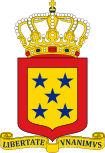Elections in the Netherlands Antilles
Appearance
 |
|---|
Elections in the Netherlands Antilles were held for two territorial levels of government: the state, and the island territories.
The Netherlands Antilles had a multi-party system, with numerous political parties to form coalition governments after the elections. The Estates (Staten) consisted of 21 or 22 members, elected for a four-year term. Its seats were distributed among the island territories:
Table
| Island territory | 1948–1950 | 1950–1977 | 1977–1983 | 1983–1986 | 1986–2010 |
|---|---|---|---|---|---|
| Aruba | 8 | 8 | 8 | 8 | – |
| Bonaire | 2 | 1 | 1 | 1 | 3 |
| Curaçao | 8 | 12 | 12 | 12 | 14 |
| Windward Islands (Saba, Sint Eustatius and Sint Maarten) | - | 1 | 1 | – | – |
| Saba | 1 | – | 1[a] | 1 | 1 |
| Sint Eustatius | 1 | – | 1[a] | 1 | 1 |
| Sint Maarten | 1 | – | – | 1 | 3 |
| Total | 21 | 22 | 22[a] | 24 | 22 |
2002 general election
2006 general election
The 2006 general election resulted in the last Estates that would sit for four years. It preceded the 2010 Netherlands Antilles general election, which took place in January and was dissolved upon the dissolution of the Netherlands Antilles.
2010 general election
See also
Notes
- ^ a b c In 1977, Saba and Sint Eustatius were allowed to send 2 non-voting representatives to the Estates due to the electoral weight of Sint Maarten in the election for the Windward Islands voting representative to the Estates. This representative continued to represent Saba, Sint Eustatius and Sint Maarten until the territory was split up in 1983.
